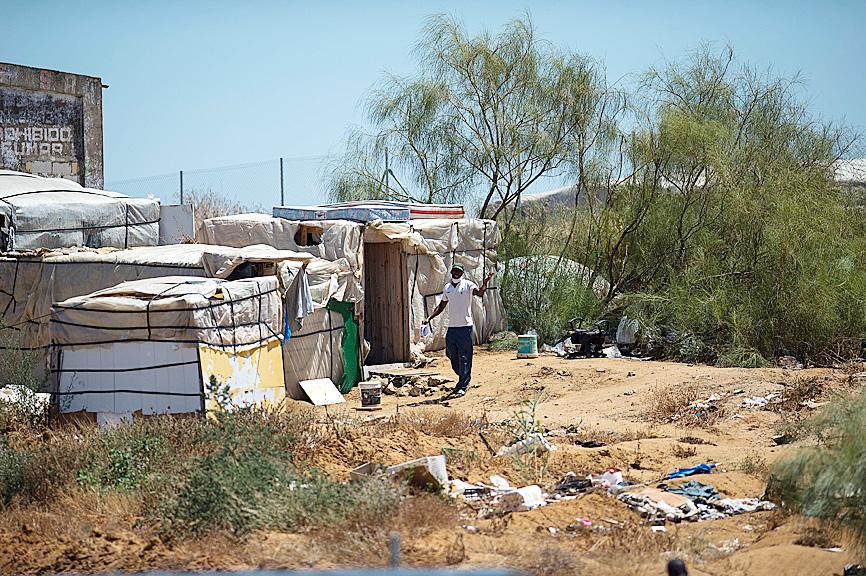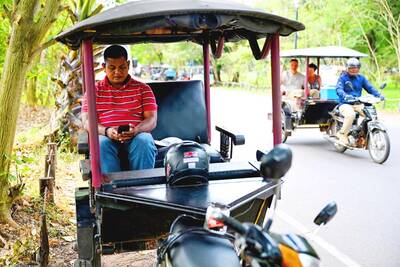Lamine Diakite has been on the street for two weeks since the Spanish shantytown he was staying in burned down, one of hundreds of fruit pickers abandoned as COVID-19 cases soar.
To protest their situation, he and dozens of other African workers have taken their mattresses and are sleeping in a square outside the town hall in Lepe, near the Portuguese border.
“Our huts have been burnt down, leaving more than 200 of us in the street,” said Diakite, a 32-year-old Malian. “And during the pandemic, that’s a risk for us and for the rest of the population.”

Photo: AFP
Known for its strawberries, Lepe in southern Spain supplies a large part of the European market. There, as in other agricultural areas, workers live in basic shelters without light or running water, cobbled together from wooden pallets, plastic sheeting and mattresses, spaces they trade among themselves for about 250 euros (US$295).
Despite the unsanitary conditions and impossibility of observing social distancing, no COVID-19 tests have been carried out in the camps, the migrants and Lepe officials said.
Even so, many have gone on to work in other areas of Spain, such as Lerida in the northeast, where regional authorities last month reimposed a two-week lockdown after the emergence of a new outbreak linked to seasonal workers.
“It’s very likely there will continue to be outbreaks linked to seasonal workers,” the Spanish Ministry of Health’s emergencies coordinator Fernando Simon said this week.
Only the northern region of La Rioja has taken drastic measures, pledging to test all seasonal workers whether they have a contract or not.
In the middle of last month, three shantytowns went up in flames around Lepe in a string of fires that began just after the picking season for strawberries, raspberries and blueberries ended.
“It was a crazy night,” said Ismaila Fall, a 30-year-old Senegalese man who tried to put out the blaze with water and sand, and suspected it was deliberate.
However, when it comes to finding a solution, neither the state nor local authorities are willing to take responsibility.
The migrants “are the government’s problem, not the town hall’s, we can’t regularize their situation,” said Manuel Mora, mayor of Lucena del Puerto, where another camp burned down.
“Before the harvest, they should have a PCR [polymerase chain reaction] test, but that costs the farmer a lot of money, so the government should help” by providing them, said Juan Jose Alvarez Alcalde, who heads the ASAJA farmworkers’ union.
There have been makeshift encampments in the Lepe area going back to 1980s, with the UN’s expert on poverty and human rights Olivier De Schutter calling on local authorities to urgently “end the situation of degradation in which seasonal agricultural workers live.”
The town hall had suggested the army set up a field camp on a plot of industrial land, but the military rejected because of the extreme summer heat, a government source told reporters.
NETWORK
“We need a network of lodgings in all agricultural communities” in the area, Lepe town council deputy head Jesus Toronjo said.
It was looking at a ranch owned by the municipality with space for 800 people, he added.
Any solution would require cooperation between local authorities, with support from the regional or central government, but that does not look likely given a proliferation of local power struggles.
“Everyone is just passing the buck,” said Antonio Abad, who heads a non-governmental organization called Asisti that helps migrants. “The problem is the lack of political will” with an immigrant population that “doesn’t take part in polls.”

The death of a former head of China’s one-child policy has been met not by tributes, but by castigation of the abandoned policy on social media this week. State media praised Peng Peiyun (彭珮雲), former head of China’s National Family Planning Commission from 1988 to 1998, as “an outstanding leader” in her work related to women and children. The reaction on Chinese social media to Peng’s death in Beijing on Sunday, just shy of her 96th birthday, was less positive. “Those children who were lost, naked, are waiting for you over there” in the afterlife, one person posted on China’s Sina Weibo platform. China’s

‘NO COUNTRY BUMPKIN’: The judge rejected arguments that former prime minister Najib Razak was an unwitting victim, saying Najib took steps to protect his position Imprisoned former Malaysian prime minister Najib Razak was yesterday convicted, following a corruption trial tied to multibillion-dollar looting of the 1Malaysia Development Berhad (1MDB) state investment fund. The nation’s high court found Najib, 72, guilty on four counts of abuse of power and 21 charges of money laundering related to more than US$700 million channeled into his personal bank accounts from the 1MDB fund. Najib denied any wrongdoing, and maintained the funds were a political donation from Saudi Arabia and that he had been misled by rogue financiers led by businessman Low Taek Jho. Low, thought to be the scandal’s mastermind, remains

Australian Prime Minister Anthony Albanese yesterday announced plans for a national bravery award to recognize civilians and first responders who confronted “the worst of evil” during an anti-Semitic terror attack that left 15 dead and has cast a heavy shadow over the nation’s holiday season. Albanese said he plans to establish a special honors system for those who placed themselves in harm’s way to help during the attack on a beachside Hanukkah celebration, like Ahmed al-Ahmed, a Syrian-Australian Muslim who disarmed one of the assailants before being wounded himself. Sajid Akram, who was killed by police during the Dec. 14 attack, and

VISHNU VANDALS: A Cambodian official accused Thailand of destroying a statue in a disputed border area, with video showing the Hindu structure being torn down The Thai military said ceasefire talks with Cambodia, set to begin yesterday, are expected to conclude with a meeting of the countries’ defense ministers on Saturday, as the two sides seek to end weeks of deadly clashes. The talks started at 4pm in Thailand’s Chanthaburi Province, which borders Cambodia. The Thai Ministry of Defense outlined several demands to be discussed ahead of the bilateral meeting of the General Border Committee (GBC) on Saturday. If secretariat-level discussions fail to reach agreement on key technical frameworks such as troop deployments, the Thai side would not proceed with the GBC meeting or sign any agreement on